| Srl | Item |
| 1 |
ID:
183423
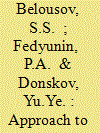

|
|
|
|
|
| Summary/Abstract |
This paper considers the role and place of fighter aircraft in fulfilling their intended missions in a projected operational environment in the Black Sea area. The authors propose an approach to building a spatiotemporal model of fighter combat as the basis for a mathematical description of the process of its control and the substantiation of operational and tactical requirements for the communication system as the technical basis of the control system.
|
|
|
|
|
|
|
|
|
|
|
|
|
|
|
|
| 2 |
ID:
170952
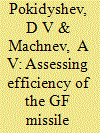

|
|
|
|
|
| Summary/Abstract |
The authors present the hierarchy analysis method as a means of assessing the efficiency of the Ground Forces (GF) Missile Forces control subsystem
|
|
|
|
|
|
|
|
|
|
|
|
|
|
|
|
| 3 |
ID:
114034
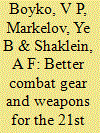

|
|
|
|
|
| Publication |
2012.
|
| Summary/Abstract |
The authors discuss improvements in the Russian troops' combat gear and show ways to be followed in research to design soldiers' combat gear for the 21st century.
|
|
|
|
|
|
|
|
|
|
|
|
|
|
|
|
| 4 |
ID:
093310
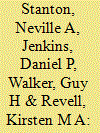

|
|
|
|
|
| Publication |
Surrey, Ashgate, 2009.
|
| Description |
xix, 210p.
|
| Series |
Human factors defence
|
| Standard Number |
9780754677598
|
|
|
|
|
|
|
|
|
|
|
|
Copies: C:1/I:0,R:0,Q:0
Circulation
| Accession# | Call# | Current Location | Status | Policy | Location |
| 054712 | 355.33041/STA 054712 | Main | On Shelf | General | |
|
|
|
|
| 5 |
ID:
098740
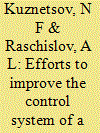

|
|
|
| 6 |
ID:
173713
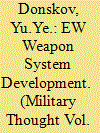

|
|
|
|
|
| Summary/Abstract |
This paper looks at issues of rationally managing the development of the weapon systems in electronic warfare (EW), including the tasks of making a system of control over the complete life cycle of EW equipment and methodological support of hardware items at the initial stages of the life cycle, R&D. It shows that to optimize the costs of the item's life cycle it is necessary to take into account not only its performance characteristics, but also its constructive and operational indices.
|
|
|
|
|
|
|
|
|
|
|
|
|
|
|
|
| 7 |
ID:
107055
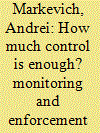

|
|
|
|
|
| Publication |
2011.
|
| Summary/Abstract |
The article examines the control system that Stalin established to enforce his orders. Historical records demonstrate that Stalin designed the system's scope, organisation and credentials to maximise its cost-effectiveness. On several occasions Stalin deliberately limited the system's size and stimulated whistle-blowing in an attempt to mitigate running costs. In contrast, distorted preferences and constraints on inspectors' loyalty contributed to the multiplication of the number of monitoring agencies. Because his orders were incomplete, Stalin authorised his inspectors not only to monitor, but also to intervene in operational matters wherever necessary.
|
|
|
|
|
|
|
|
|
|
|
|
|
|
|
|
| 8 |
ID:
145843
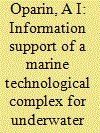

|
|
|
|
|
| Summary/Abstract |
The issues of increasing efficiency of search-and-rescue and underwater engineering works due to the integrated employment of underwater vehicles and carrying vessels as well as fuller using advantages of the internal sources of information gathering and processing.
|
|
|
|
|
|
|
|
|
|
|
|
|
|
|
|
| 9 |
ID:
098952
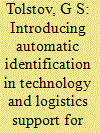

|
|
|
| 10 |
ID:
191499
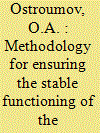

|
|
|
|
|
| Summary/Abstract |
This article considers a methodological approach to ensuring the stable functioning of the military communication system, which is a critical element of control systems. The approach presented in the article, unlike existing approaches, takes into account the criticality of the communication system itself and its elements.
|
|
|
|
|
|
|
|
|
|
|
|
|
|
|
|
| 11 |
ID:
091592
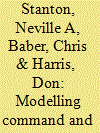

|
|
|
|
|
| Publication |
Aldershot, Ashgate, 2008.
|
| Description |
xiii, 249p.
|
| Series |
Human factor in defence
|
| Standard Number |
9780754670278
|
|
|
|
|
|
|
|
|
|
|
|
Copies: C:1/I:0,R:0,Q:0
Circulation
| Accession# | Call# | Current Location | Status | Policy | Location |
| 054442 | 355.33041011/STA 054442 | Main | On Shelf | General | |
|
|
|
|
| 12 |
ID:
093277
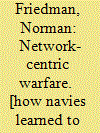

|
|
|
|
|
| Publication |
Annapolis, Naval Institute Press, 2009.
|
| Description |
xv, 360p.
|
| Standard Number |
9781591142867
|
|
|
|
|
|
|
|
|
|
|
|
Copies: C:1/I:0,R:0,Q:0
Circulation
| Accession# | Call# | Current Location | Status | Policy | Location |
| 054674 | 359.42/FRI 054674 | Main | On Shelf | General | |
|
|
|
|
| 13 |
ID:
174062
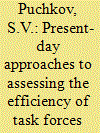

|
|
|
|
|
| Summary/Abstract |
This paper suggests a system of indices for assessing the functioning efficiency of the task forces control systems whose employment helps take into consideration the effect of basic factors in the control process.
|
|
|
|
|
|
|
|
|
|
|
|
|
|
|
|
| 14 |
ID:
135358
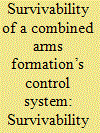

|
|
|
|
|
| Summary/Abstract |
The authors discuss ways of enhancing the survivability of a combined arms formation’s control system in a fluid situation on the battle field and offer their ideas for achieving this objective.
|
|
|
|
|
|
|
|
|
|
|
|
|
|
|
|
| 15 |
ID:
190521
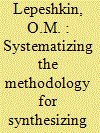

|
|
|
|
|
| Summary/Abstract |
This paper introduces the concept of criticality for communication and control systems. It shows the need to develop approaches to systematizing the methodology for synthesizing critical information infrastructure and critically important facilities of communication and control systems.
|
|
|
|
|
|
|
|
|
|
|
|
|
|
|
|
| 16 |
ID:
128540
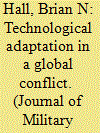

|
|
|
|
|
| Publication |
2014.
|
| Summary/Abstract |
This article seeks to contribute to recent scholarly analysis of the British Army's military performance and its leadership's willingness and ability to adapt during the First World War (1914-1918) by examining a maligned, though vital, aspect of its command and control system, communications. It offers a comparative assessment of the development and contribution of communications to British operations beyond the Western Front and concludes that the army was, on the whole, remarkably successful at adapting its communications system to suit the demands of fighting a modern, global conflict.
|
|
|
|
|
|
|
|
|
|
|
|
|
|
|
|